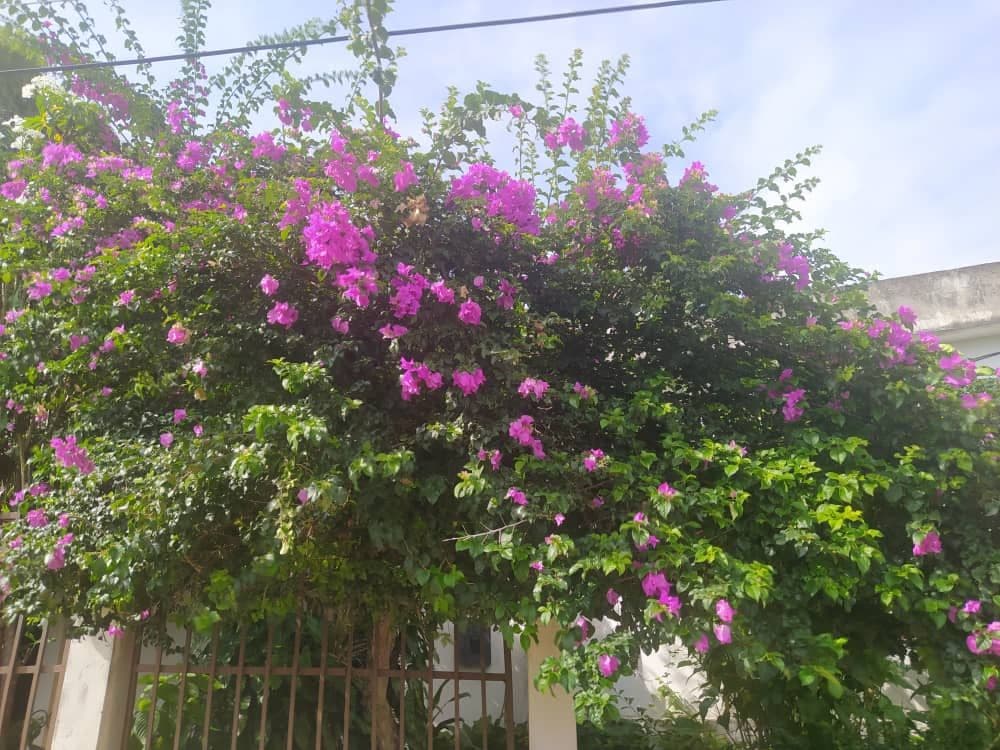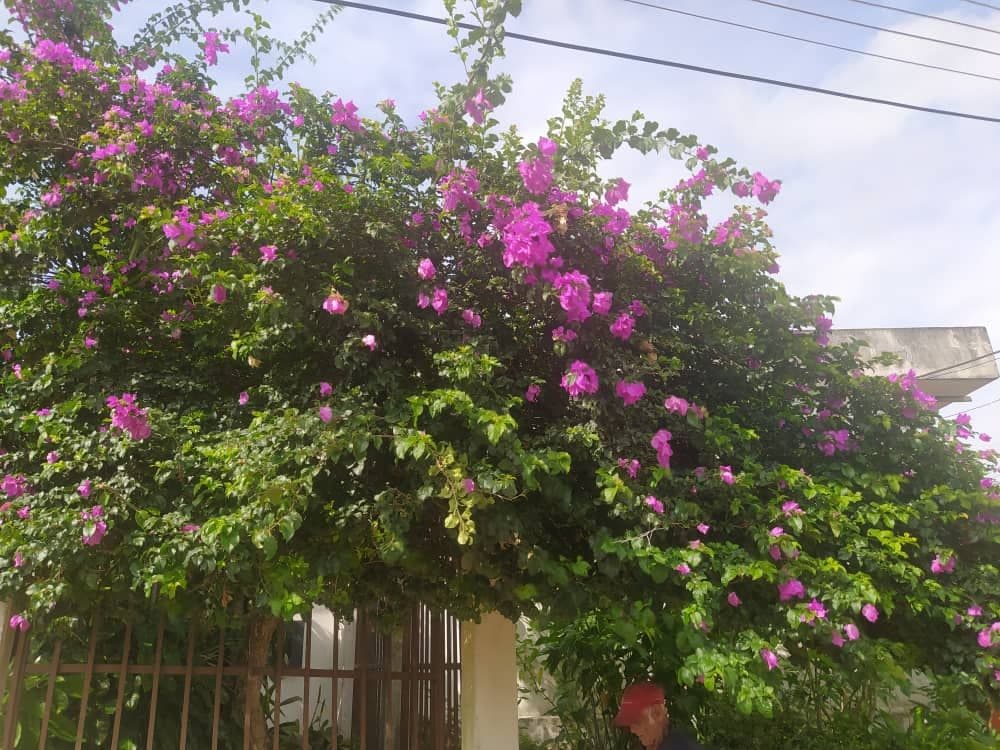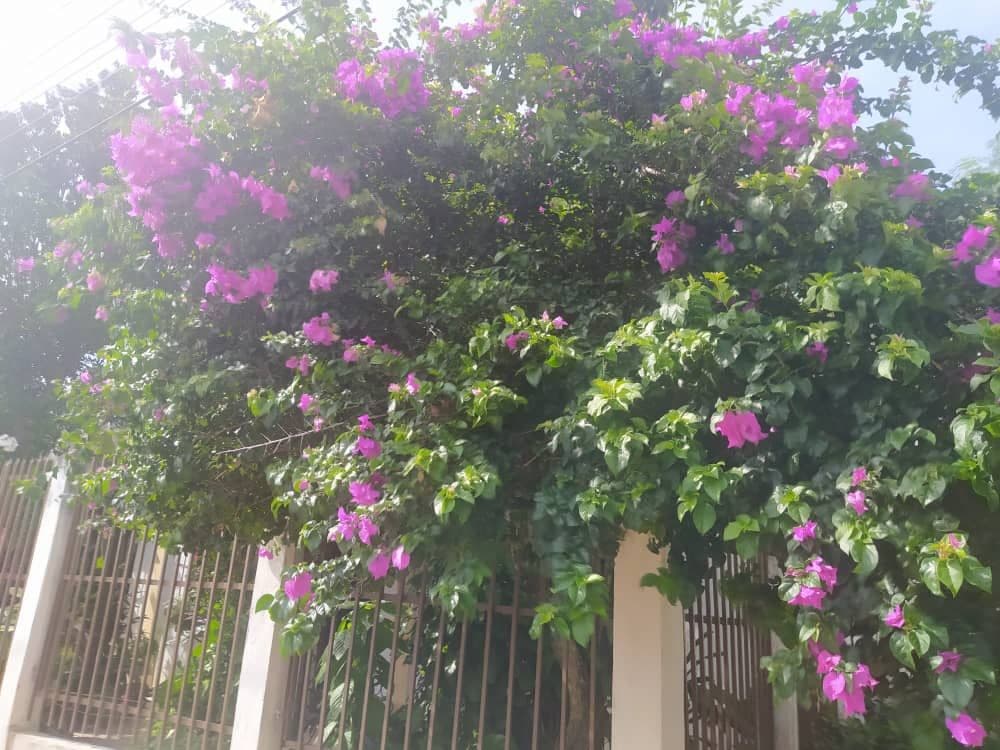
La trinitaria es un arbusto ampliamente conocido y utilizado en Venezuela como planta ornamental, adornando, jardines, parques, plazas, avenidas entre otros, por el llamativo y variado color de sus flores, que en realidad no son tales sino brácteas florales, es una planta trepadora que llega a medir unos 12 metros, embelleciendo significativamente los espacios en donde se desarrollan, se adaptan a diferentes condiciones ambientes.
Se ha hablado de las propiedades curativas de la trinitaria, en particular lo relacionado con las afecciones respiratorias, sin embargo surgió la polémica de que esta planta es altamente toxica, dilucidándose posteriormente que hubo una confusión de la trinitaria con la planta de adelfa, Nerium oleander, también conocida como laurel de flor, la cual sí es tóxica y también la llaman trinitaria en algunos países.
The trinitaria is a shrub widely known and used in Venezuela as an ornamental plant, decorating gardens, parks, squares, avenues, among others, for the striking and varied color of its flowers, which are not really such but floral bracts, is a climbing plant that reaches about 12 meters, significantly beautifying the spaces where they develop, adapt to different environmental conditions.
There has been talk of the healing properties of the trinitaria, particularly in relation to respiratory ailments, however the controversy arose that this plant is highly toxic, later elucidated that there was a confusion of the trinitaria with the oleander plant, Nerium oleander, also known as laurel flower, which is toxic and is also called trinitaria in some countries.

Nerium oleander
Esta planta es tan toxica que es necesario el uso de guantes altamente resistente para podar la planta, porque puede causar irritación o inflamación de la piel, afecciones oculares graves, y reacciones alérgicas en general. De consumirla, puede provocar náuseas y vómitos, con deposiciones diarreicas sanguinolentas. Le siguen signos neurológicos; vértigo, ataxia, midriasis, excitación nerviosa seguida de depresión, disnea, convulsiones tetaniformes. Y en seguida aparecen signos cardíacos; arritmia en aumento, taquicardia, fibrilación auricular y bloqueo con parada cardíaca, lo cual no ocurre con la trinitaria ya que es muy frecuente su manipulación sin problema alguno.
Sin embargo, el nombre que recibe la adelfa en Venezuela no es trinitaria, sino "flor de la reina". De allí viene la confusión. La planta que nosotros conocemos como trinitaria, la Bougainvillea, no es tóxica.
Recientemente presente una afección respiratoria por una gripe muy fuerte y en esos días escuche un audio que circuló por WhatsApp, en la que alguien asegura que con el uso de la trinitaria su papá superó el Covid-19. Basándome en ese testimonio, comencé a tomar te de flores de trinitaria y casi de inmediato sentí una notable mejoría, de eso hace aprox. tres meses y no tuve a Dios gracias secuela alguna que pudiera evidenciar que esa planta es venenosa.
Sin embargo, dada la importancia que ha tomado la planta de trinitaria en los últimos tiempos por el tema del Covid-19 y lo costoso de los medicamentos en Venezuela se recomienda iniciar un estudio con bases científicas de las propiedades curativas de esta planta.
Nerium oleander
This plant is so toxic that it is necessary to use highly resistant gloves to prune the plant, because it can cause irritation or inflammation of the skin, serious eye conditions, and allergic reactions in general. If consumed, it may cause nausea and vomiting, with bloody diarrheal stools. Neurological signs follow; vertigo, ataxia, mydriasis, nervous excitement followed by depression, dyspnea, tetaniform convulsions. And then cardiac signs appear; increasing arrhythmia, tachycardia, atrial fibrillation and blockage with cardiac arrest, which does not occur with the trinitaria since it is very frequent its manipulation without any problem.
However, the name that receives the oleander in Venezuela is not trinitaria, but "flower of the queen". That is where the confusion comes from. The plant we know as trinitaria, Bougainvillea, is not toxic.
Recently I had a respiratory affection due to a very strong flu and in those days I listened to an audio that circulated by WhatsApp, in which someone assures that with the use of trinitaria his father overcame the Covid-19. Based on that testimony, I began to take trinitaria flowers tea and almost immediately I felt a remarkable improvement, about three months ago and I did not have any sequelae that could show that this plant is poisonous.
However, given the importance that has taken the trinitaria plant in recent times by the issue of Covid-19 and the cost of drugs in Venezuela is recommended to initiate a study with scientific basis of the healing properties of this plant.

https://dalelavuelta.tv/trinitaria-contra-el-covid-19-esto-opina-gracian-rondon
https://eldiario.com/2021/04/28/plantas-trinitarias-bougainvillea-son-altamente-toxico
https://steemit.com/spanish/@yoselin/la-buganvilla-o-como-la-conocemos-en-venezuela-la-trinitaria
https://espaja.com/verifications/la-planta-trinitaria-es-venenosa
Todas las fotografias me pertenecen y fueron tomadas con un blu X3+
All the photographs belong to me and were taken with a blu X3 +
@tipu curate
Upvoted 👌 (Mana: 64/84) Liquid rewards.